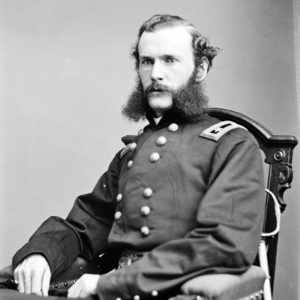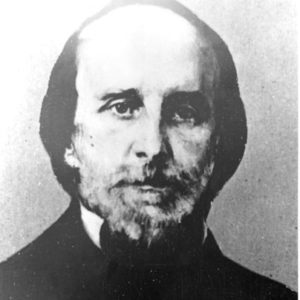calsfoundation@cals.org
Huntsville Massacre
In the midst of the Civil War, on January 10, 1863, nine men were taken from a guardhouse and led to a field on the Samuel P. Vaughn farm about one mile northeast of Huntsville (Madison County), where they were shot by Union soldiers on the bank of Vaughn’s Branch near the road that led to Carrollton (Carroll County). One survived. Although the reason for the execution may never be known, it may have been in response to the ambush of a Union army escort and the mistreatment of the daughters of Isaac Murphy by locals.
Isaac Murphy was elected in 1861 to the Secession Convention from Madison County on the Unionist platform, receiving eighty-five percent of the vote and eventually becoming the lone delegate to vote “no” on Arkansas’s secession from the Union. Upon returning to Huntsville, he was greeted well by the locals. However, this attitude changed as the war progressed and, particularly, as the war came closer to home. Although a majority of the people in and around Huntsville had been Unionists, sides were now changing.
Following the Battle of Pea Ridge, Murphy’s life was threatened, and he, along with Dr. James M. Johnson and Frank Johnson, were forced to flee to Pea Ridge (Benton County), where Murphy took a civilian position on General Samuel Curtis’s staff. Although Murphy had made arrangements to have his family moved to Missouri, the plans did not materialize, and his daughters, Louisa and Laura, remained behind in Huntsville, where they faced constant harassment. By the fall of 1862, Murphy’s daughters were most eager to visit him and made the trip to Pea Ridge. As preparations were being made for the Battle of Prairie Grove, they had to be sent back to Huntsville weeks later, a journey they began on November 16, 1862. For protection, Colonel Albert W. Bishop furnished an escort of twenty-five soldiers to accompany them.
When they were within about two miles of Huntsville, the escort decided to send the Murphy daughters into Huntsville alone. While resting, the escort was surprised by a local guerrilla band, and a skirmish ensued. Of the twenty-five soldiers sent as escort, only seven returned to Pea Ridge alive.
Following the Battle of Prairie Grove, General Francis Herron was ordered to take his 5,000 troops northeast to the Mississippi River to join General Ulysses S. Grant on his push toward Vicksburg, Mississippi. This trek took Herron and his troops through Madison County via Huntsville. Upon arrival, it was reported that the Murphy daughters were still being harassed by the locals to the point of having their personal belongings taken from them. Within days, several citizens were arrested and held for reasons not entirely clear.
In the early morning hours of January 10, 1863, nine men were taken out for execution by members of Company G of the Eighth Missouri Cavalry, under the command of Lieutenant Colonel Elias Briggs Baldwin. Those executed included Chesley H. Boatright, a blacksmith, former county treasurer, deacon of the Huntsville Cumberland Presbyterian Church, and prominent Mason; William Martin Berry, a prominent member of Odeon Masonic Lodge and son-in-law of Isaac Murphy; Hugh Samuel Berry, son of the aforementioned William M. Berry and captain in the Confederate army, home on leave; John William Moody, nephew-in-law to Chesley H. Boatright and a deputy U.S. marshal and farmer; Confederate army captain Askin Hughes; John Hughes; Watson P. Stevens, a cousin of the Berrys; Robert Coleman Young, a Baptist minister; and Bill Parks. One of the nine, Parks, survived and left for Mississippi after he had recuperated.
Word of the massacre spread quickly among the Union troops, and within weeks Lt. Col. Baldwin was arrested and charged with “violation of the 6th Article of War for the murder of prisoners of war.” He was transported to Springfield, Missouri, where he was to be held pending a trial before a military commission. Many of the requested witnesses were either too ill to attend or on active duty and did not attend the trial. Due to the lack of witnesses, charges against Baldwin were dropped, and he was discharged.
The execution had a profound effect on the area and contributed to the closing of two colleges in Huntsville. Isaac Murphy was the head of the Masonic-sponsored college, and his daughters and wife ran the female seminary. As both were sponsored by the Masonic fraternity, and as several prominent Masons were executed, the lodge closed the school. The Masons no doubt felt that Murphy and Dr. James Johnson (also a prominent Mason) had a hand in the arrest of those executed. No connection between those executed and the ambush of the Union military escort was ever established.
For additional information:
Hatfield, Kevin. “The Huntsville Massacre—The Civil War Forever Changes a Community.” Madison County Musings 25 (Winter 2006): 174–192.
The Huntsville Massacre. Huntsville, AR : Madison County Genealogical and Historical Society, 2007.
Smith, John “The Huntsville Massacre.” Carroll County Historical Quarterly 19 (Summer–Fall 1974): 10–12.
Kevin Hatfield
Huntsville, Arkansas
 Francis Herron
Francis Herron  Isaac Murphy
Isaac Murphy 




Comments
No comments on this entry yet.